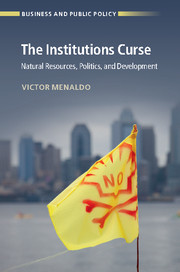Book contents
- Frontmatter
- Dedication
- Contents
- List of figures
- List of maps
- List of tables
- Acknowledgments
- 1 Introduction
- 2 Three puzzles and some building blocks
- 3 Intellectual heritage of the institutions curse view
- 4 The institutions curse theory
- 5 Not manna from heaven after all: the endogeneity of oil
- 6 The resource blessing
- 7 Oil curse or monarchical exceptionalism?
- 8 Conclusions
- References
- Author index
- Subject index
2 - Three puzzles and some building blocks
Published online by Cambridge University Press: 05 August 2016
- Frontmatter
- Dedication
- Contents
- List of figures
- List of maps
- List of tables
- Acknowledgments
- 1 Introduction
- 2 Three puzzles and some building blocks
- 3 Intellectual heritage of the institutions curse view
- 4 The institutions curse theory
- 5 Not manna from heaven after all: the endogeneity of oil
- 6 The resource blessing
- 7 Oil curse or monarchical exceptionalism?
- 8 Conclusions
- References
- Author index
- Subject index
Summary
After outlining three important puzzles that challenge the resource curse, this chapter provides other essential building blocks that put these puzzles in perspective and previews some of the important themes that recur across the book. This chapter's second section suggests an alternative way to make sense of the so-called resource curse. It provides other examples of the institutions curse that are not related to natural resources. This serves to show that the pathologies that have been causally attributed to natural resources, and especially oil, are actually symptoms of an underlying syndrome, as are other maladies such as crony capitalism and corruption. The third section identifies important conceptual and methodological themes that will be pursued in the remainder of the book.
The first of three puzzles
The ascendance of the resource curse theory sharply clashes with the fact that natural resources have been a key engine of political and economic development throughout history. This is particularly the case for Europe and North America. While mineral wealth has repeatedly bankrolled imperial expansion in the former, it also buoyed fledgling nations founded by European settlers in the latter. Industrial revolutions were fueled by coal, precious metals, and oil. Today, countries as diverse as Canada, Australia, and Norway have thriving economies centered on mining and hydrocarbons.
Over the ages, the ability to control gold mines and, by extension, mint gold coins has been the fulcrum to imperial conquest and control. Consider various European and Middle Eastern kingdoms that rose and fell in concert with their dominion over the much vaunted Nubian gold mines in southern Egypt and northern Sudan. This was as true of the Egyptian pharaohs, beginning as early as 3100 B.C., as it was of their latter day successors, the Roman emperors.
The post-Roman examples are the most instructive. The Byzantine kings inherited control of these inimitable North African mines from the Romans and exploited them to coin gold specie. This allowed Byzantine rulers to finance numerous wars and pay hefty bribes to potential invaders, such as the Lombards, therefore dissuading them from crashing Constantinople's gates. When control of the Nubian mines was transferred to the Rashidun Caliphate in 641, after Arab Armies wrested control of Egypt from the Byzantines, the Muslim empire quickened the pace of gold extraction, while reopening abandoned mines in Ethiopia.
- Type
- Chapter
- Information
- The Institutions CurseNatural Resources, Politics, and Development, pp. 25 - 42Publisher: Cambridge University PressPrint publication year: 2016

